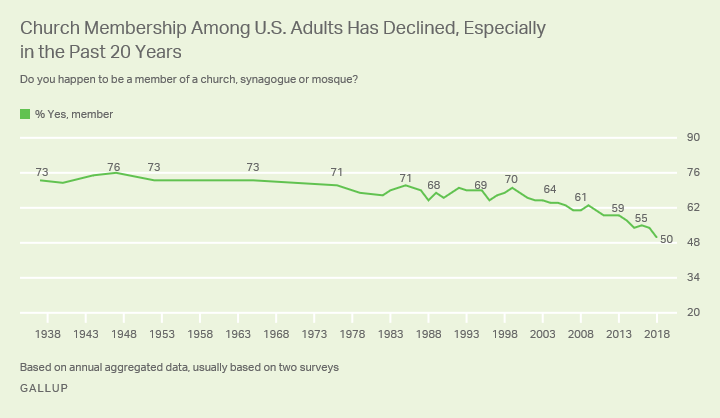 Half of Americans are church members, down from 70% in 1999
Half of Americans are church members, down from 70% in 1999- Most of the decline attributable to increase in percentage with no religion
- Membership has fallen nine points among those who are religious
WASHINGTON, D.C. — As Christian and Jewish Americans prepare to celebrate Easter and Passover, respectively, Gallup finds the percentage of Americans who report belonging to a church, synagogue or mosque at an all-time low, averaging 50% in 2018.
U.S. church membership was 70% or higher from 1937 through 1976, falling modestly to an average of 68% in the 1970s through the 1990s. The past 20 years have seen an acceleration in the drop-off, with a 20-percentage-point decline since 1999 and more than half of that change occurring since the start of the current decade.

The decline in church membership is consistent with larger societal trends in declining church attendance and an increasing proportion of Americans with no religious preference.
This article compares church membership […]

Republican State Representative Richard Collins of Delaware
Delaware state Rep. Richard Collins (R) said this week that he was sponsoring an anti-abortion bill because women are not replenishing the U.S. population quickly enough.
While speaking to WGMD-FM on Tuesday, Collins explained that he was introducing a bill that would require women to listen to the fetal heartbeat before having an abortion. A second bill would outlaw abortion after 20 weeks.
“God is moving in strange and wonderful ways, folks,” the lawmaker insisted. “Gun bills that we’ve talked about will save essentially no lives because it will have no impact on criminals getting of keeping their guns. But every single year, we kill hundreds of people in abortions.”
“You know, we have a massive problem in this country,” he continued. “Our birthrate is way, way below replacement [levels]. You know, we are just not having enough babies.”
According to Collins, women are “doing away” with their fetuses “before they have a chance to grow into these people that we need to support us.”
“These bills are very, very […]
 Demographers, sociologists, economists and other researchers gather in Austin, Texas, this week for the annual meeting of the Population Association of America. As the meeting convenes, here are six notable demographic trends highlighted in Pew Research Center analyses over the past year:
Demographers, sociologists, economists and other researchers gather in Austin, Texas, this week for the annual meeting of the Population Association of America. As the meeting convenes, here are six notable demographic trends highlighted in Pew Research Center analyses over the past year:
1Millennials are the largest adult generation in the United States, but they are starting to share the spotlight with Generation Z. This year, Millennials, those ages 23 to 38, will outnumber Baby Boomers (ages 55 to 73), according to Census Bureau projections. Now in their young adulthood, Millennials are more educated, more racially and ethnically diverse and slower to marry than previous generations were at the same age. But after growing up in the Great Recession, their economic picture is mixed: Young adult households are earning more than most older Americans did at the same age, but have less wealth than Boomers did at the same age, partly because they are more likely to have higher amounts of student loan debt.
Although the nation’s 73 million Millennials are the largest living adult generation, the next one – Generation Z – is entering adulthood. […]

Michele Bachmann
A study published in the journal Neuropsychologia has shown that religious fundamentalism is, in part, the result of a functional impairment in a brain region known as the prefrontal cortex. The findings suggest that damage to particular areas of the prefrontal cortex indirectly promotes religious fundamentalism by diminishing cognitive flexibility and openness—a psychology term that describes a personality trait which involves dimensions like curiosity, creativity, and open-mindedness.
Religious beliefs can be thought of as socially transmitted mental representations that consist of supernatural events and entities assumed to be real. Religious beliefs differ from empirical beliefs, which are based on how the world appears to be and are updated as new evidence accumulates or when new theories with better predictive power emerge. On the other hand, religious beliefs are not usually updated in response to new evidence or scientific explanations, and are therefore strongly associated with conservatism. They are fixed and rigid, which helps promote predictability and coherence to the rules of society among individuals within the group.
Religious fundamentalism refers to an ideology that […]

 WASHINGTON, D.C. — Nearly three dozen doctors and a host of other medical professionals across eight states were charged for illegally prescribing and distributing
WASHINGTON, D.C. — Nearly three dozen doctors and a host of other medical professionals across eight states were charged for illegally prescribing and distributing 






